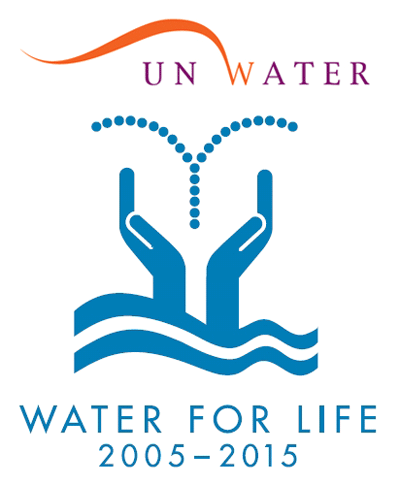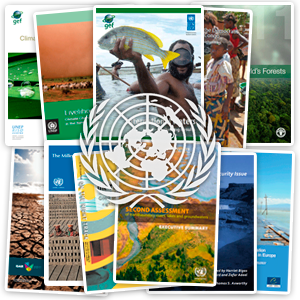- ON THE DECADE
- THE DECADE'S CAMPAIGN
- REPORTING ON PROGRESS
- THE DECADE'S PROGRAMMES
- FOCUS AREAS
-
- Access to sanitation
- Financing water
- Gender and water
- Human right to water
- Integrated Water Resources Management
- Transboundary waters
- Water and cities
- Water and energy
- Water and food security
- Water and sustainable development
- Water and the green economy
- Water cooperation
- Water quality
- Water scarcity
- FOCUS REGIONS
- RESOURCES FOR
- UN e-RESOURCES
Reporting on progress from the United Nations system
UN agencies and partners were called to action by the 2003 resolution on the Decade (A/RES/58/217). This UN Resolution assigned responsibilities for its implementation to both, UN-Water and the Member States: UN-Water is coordinating activities of the United Nations for implementing the Decade, including with non-United Nations partners. At the national level, it is expected that each country will take its own approach to organizing activities around the “Water for Life” Decade through, for example, national committees (United Nations, 2005).
The UN system has responded to the mandate provided to it by the United Nations General Assembly. UN-Water has played a prominent role in the implementation of activities related to the Water Decade.
Planning of actions for the Water Decade
After agreeing on the Decade, and in the same year also agreeing on the creation of UN-Water, the Secretariat of UN-Water, based at the United Nations Department of Economic and Social Affairs (UNDESA) in New York, started to work on the implementation of the Decade. A report was prepared by UNDESA in collaboration with UN-Water and was presented to the UN General Assembly by the Secretary General (A/60/158, United Nations, 2005). This report outlined the goals of the Decade, who would be involved, how it would be coordinated and proposed some concrete actions.
In the 2005 SG report to the General Assembly a more detailed plan was drawn up, where the intended focus for UN-Water was articulated through a number of thematic initiatives:
- Coping with water scarcity and pollution;
- Sanitation, safe drinking water and health;
- Gender mainstreaming in water and sanitation;
- Integrated water resources management;
- Transboundary water issues;
- Disaster risk reduction.
Africa was selected as a geographical focus due to its exceptional needs in water and sanitation.
The 2005 report to the General Assembly (United Nations, 2005) lists a number of specific activities pledged by UN agencies to support the Decade. Similarly, in the report that was prepared in 2010 at the request of the General Assembly, there is a succinct description of the specific activities for supporting Member States by UNDP, UNDESA, FAO, WHO, World Bank and UNICEF (A/65/297, United Nations, 2010).
The UN Department of Public Information engaged in coordinating the creation and use of the Decade’s logo, the preparation of an advocacy guide and other communication initiatives.
Decade’s programmes
Two programmes were launched at the outset of the Water for Life Decade and became fully operational within the first few years of the Decade: The United Nations Water Decade Programme on Capacity Development (UNW-DPC) and the UN-Water Decade Programme on Advocacy and Communication (UNW-DPAC). These programmes are supported by the governments of Germany and Spain, and hosted by the United Nations University (UNU) and the United Nations Department of Economic and Social Affairs (UNDESA), respectively.
The activities undertaken by these two programmes have furthered the Water Decade agenda on the specific focus areas of the Decade. By doing so, they have instigated responses by the Member States. Specific activities undertaken by UNW-DPAC include the Water for Life Decade website and an annual ‘Best Practices Award’ linked to the Water for Life Decade. UNW-DPC’s activities have focused supporting UN-Water and the implementation of its Decade themes through capacity development.
World Water Day
UN-Water has also initiated a number of other actions in concert with its member organisations and a growing number of international partners. The most prominent of these is the World Water Day (22 March), which has become a well-established communications mechanism for drawing attention to a theme relevant to the Water Decade.
Decade mainstreaming in the work of UN-Water, and its members
The Decade has been ‘mainstreamed’ in the work of UN-Water. For the UN system the Decade was intended to provide a means for coordinating and bringing together the water-related activities within the UN system, a function that UN-Water is indeed performing.
UN-Water is providing guidance to achieving the Millennium Development Goals (MDG) and Johannesburg Plan of Implementation (JPoI) goals, concentrating efforts on the themes of the Task Forces and Thematic Priority Areas. Both with regards to the actions at Member State level and the various efforts by UN agencies, there is an increasing level of coordination and management around the themes of the Decade.
The progress being made on water supply and sanitation and analyses of constraints at country level are reported through the UN-Water reports such as JMP and the GLAAS initiatives. Further reporting on the management of water resources has been undertaken by UNEP and WWAP.
The facts on the ground show that the actual goals of the Decade have survived quite well and are at the forefront of action. Since the creation of the Decade and UN-Water, the latter has become an increasingly important and recognised institution, demonstrating the UN’s commitment to action on water. More focused activities, such as the five year drive for sanitation, have become emblematic of this commitment and this has been linked to the Decade.
The UN-Water members and partners have been progressing in the implementation of the actions pledged in the initial 2005 plan.
Today, the most extensive overview of the activities by UN-Water members is provided by the UN-Water Activity Information System (UNWAIS).
2010 Midterm review
A Conference for the mid-term review of the Water for Life Decade was organised in Dushanbe from 8 to 9 June 2010 at the request of the Government of Tajikistan. The primary objective of the conference was to undertake a mid-term review of the activities under the Water for Life Decade and chart a course for the remainder of the Decade. The latter element manifested in the form of a set of recommendations that were later presented by the Government of Tajikistan to the United Nations General Assembly (UNGA). UN-Water played an instrumental role in bringing together a number of UN agencies along with international expertise to deliver this conference, and in the development and dissemination of the conference recommendations.
At the request of the UNGA, a SG report (A/65/297) was prepared on the progress of the decade. This was prepared for a high-level meeting which took place in New York on World Water Day 2010. These 2010 report on the Decade to the General Assembly (at their request), follows the structure of the 2005 plan. It is a very compact summary of the (many) activities that UN-water members and UN-Water have implemented.
The 2010 report shows that there was a significant organisational response to the start of the Decade: two programmes were created to support the Decade, the UN-Water Decade Programme on Capacity Development (UNW-DPC) unwdpc.shtml at the United Nations University in Bonn, Germany, and the UN-Water Decade Programme on Advocacy and Communication (UNW-DPAC) unwdpac.shtml in Zaragoza, Spain.
The report also shows that the activities by UN-Water members are fully overlapping with the activities of the Decade for achieving the Millennium Development Goals, complemented with the 2002 Johannesburg goals.
Support to country level action and logo users
The UN-Water Secretariat at UNDESA has undertaken some concrete and coordinated actions to support the Decade, including the approval of the use of the Decade’s logo and administering the creation of ‘focal points’ - national contact persons to support the Decade at country level. The focal points were intended to facilitate the dissemination of information on the Decade in the countries.
>> Water for Life Voices campaign
>> Submit your voice!
>> Your #WaterForLifeVoices on Flickr
![]() Flickr
Flickr
![]() Slideshare
Slideshare
![]() Twitter
Twitter
![]() YouTube
YouTube

>> Outcome Document from OWG on Sustainable Development Goals
>> A Post-2015 Global Goal for Water: Synthesis of key findings and recommendations from UN-Water 
>> Post 2015 Water Thematic Consultation Report
>> Report of the High-Level Panel of Eminent Persons on the Post-2015 Development Agenda
>> UN-Water section on water in the post-2015 process
>> UN post-2015 agenda
>> DESA section on Post-2015
>> JMP Post-2015 global monitoring
>> Sustainable Development Goals e-Inventory
>> Summary of Stock taking meeting of Intergovernmental Negotiations on the Post-2015 Development Agenda
>> Synthesis Report of the Secretary-General on the Post-2015 Agenda
>> Decade's weekly
The Decade's weekly brings you every week the latest news from the Decade.
>> Bimonthly Publications Review 25, 26 and 27 [ - 546 Kb]
- 546 Kb]
UNW-DPAC. May 2015
>> Previous issues
Sustainable Development
15-17 January 2015: UN-Water International Zaragoza Conference ‘Water and Sustainable Development: From vision to action’
22 March 2015: World Water Day on Water and Sustainable Development
Biodiversity
2011-2020: UN Decade on Biodiversity
Deserts and Desertification
2010-2020: UN Decade for Deserts and the Fight Against Desertification
Energy
2014-2024: Decade on Sustainable Energy for All
22 March 2014: World Water Day on 'Water and Energy'
Sanitation
2011-2015: Sustainable sanitation: The Five-Year-Drive to 2015
19 November 2014: World Toilet Day
Copyright | Terms of use | Privacy notice | Site Index | Fraud alert | Help










